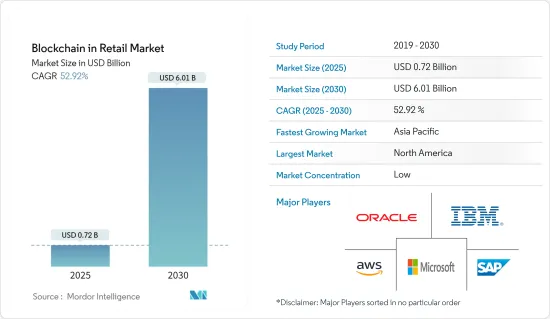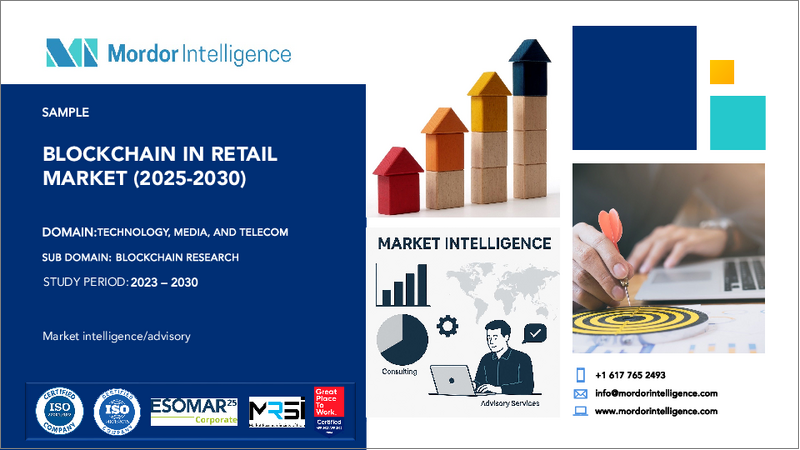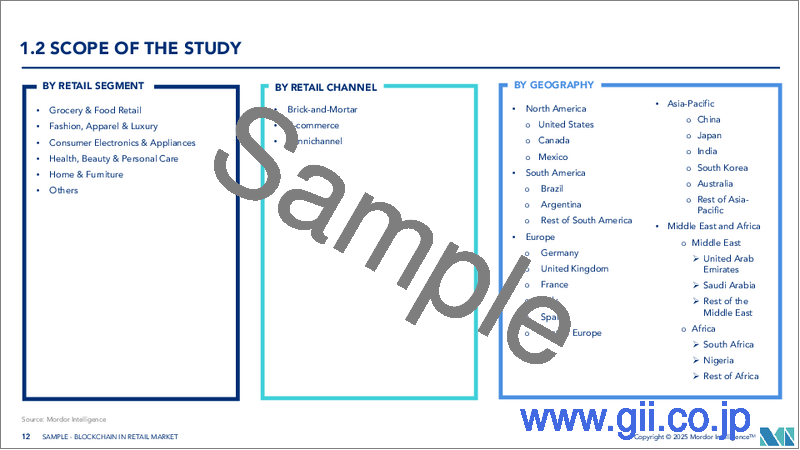|
|
市場調査レポート
商品コード
1641976
小売業におけるブロックチェーン-市場シェア分析、産業動向・統計、成長予測(2025年~2030年)Blockchain in Retail - Market Share Analysis, Industry Trends & Statistics, Growth Forecasts (2025 - 2030) |
||||||
カスタマイズ可能
適宜更新あり
|
|||||||
| 小売業におけるブロックチェーン-市場シェア分析、産業動向・統計、成長予測(2025年~2030年) |
|
出版日: 2025年01月05日
発行: Mordor Intelligence
ページ情報: 英文 120 Pages
納期: 2~3営業日
|
全表示
- 概要
- 目次
小売業におけるブロックチェーン市場規模は2025年に7億2,000万米ドルと予測され、予測期間(2025~2030年)のCAGRは52.92%で、2030年には60億1,000万米ドルに達すると予測されます。

主要ハイライト
- 小売業のサプライチェーンにおける透明性への要求の高まり、摩擦のない迅速な取引、顧客サービスの向上への要求が、小売業におけるブロックチェーン市場の成長を促進しています。
- ブロックチェーン技術により、小売企業は透明で安全な記録管理を維持し、商品の出所を追跡し、安全な取引を行う方法を提供することができます。また、小売セグメントにおけるブロックチェーン技術は、デジタル記録を安全かつ可聴的に保存するのに役立ち、資産の安全かつ迅速でコスト効率の高い移転を可能にします。このように、小売セグメントにおけるブロックチェーンの需要を牽引しています。
- 小売ビジネスのバリューチェーンを改善するブロックチェーンの利点は大きく、過去数年間で大きな支持を得ており、市場成長にプラスの影響を与えています。データとトランザクションをデジタル台帳に載せることで、トランザクションのスピードを速め、紙ベースのプロセスを排除し、多様なサプライチェーンで商品を追跡し、偽物を排除することができます。
- さらに、迅速で摩擦のない取引を求める消費者のニーズは、モバイルやオンラインeコマースの不正行為と関連コストの急増につながっています。ブロックチェーン技術は、小売セグメントにおける高速で摩擦のない安全な取引を大幅に可能にしています。さらに、ロイヤルティプログラムデータの取り扱い、安全性、分散化におけるブロックチェーンの効率性も、小売セグメントにおけるブロックチェーンの採用を促進しています。この技術は、プログラムや小売業者間でのポイントの作成とトランスミッションを容易にします。
- さらに、小売店での盗難が増加していることも、不正防止と検知を目的とした小売セグメントにおけるブロックチェーン技術の需要を後押ししています。例えば、全米小売業協会の2022年小売セキュリティ調査のデータによると、盗品による小売損失は2020年の908億米ドルから2021年には945億米ドルに増加しました。
- COVID-19のパンデミックは消費者の経済的可能性を低下させ、小売ブロックチェーンサービスやソリューションの売上を減少させました。しかし、パンデミック後、小売業は大流行時の経済的後退から回復し始め、予測期間中、小売セグメントにおけるブロックチェーンの成長に大きな機会を提供すると期待されています。
小売業におけるブロックチェーン市場の動向
サプライチェーンと在庫管理セグメントが大きなシェアを獲得すると予想されます。
- ブロックチェーン技術は、不正、盗難、検知を防止するために、サプライチェーン、ロイヤルティプログラム、決済プロセスなどの様々な小売業務で大きな支持を得ています。例えば、ブロックチェーントークンは、ロイヤルティプログラムの最適化や不正防止の強化に利用できます。また、小売業者は、製品の透明性の向上とトレーサビリティの改善を通じて、サプライチェーンにおける不正を削減し、さらには防止するために、ブロックチェーン技術を急速に導入しています。
- さらに、COVID-19の流行により、小売業者は顧客体験の向上を提供するため、オンラインやオムニチャネルへの移行を急速に進めています。しかし、店舗、eコマース、オムニチャネルなどあらゆる媒体で盗難が増加し続けており、小売店の盗難や不正を防止するためのブロックチェーン技術への需要が高まっている
- さらに、小売店での盗難は大小の小売企業にとって重要な課題となっているため、小売業におけるブロックチェーン技術の採用が急速に進んでいます。例えば、米国商工会議所が昨年9月に発表した新しいデータによると、小規模小売企業の半数以上(56%)が、過去1年間に店舗からの盗難を経験したと回答しています。
- このような発展と小売店での盗難や不正行為を防止するための需要の高まりが、予測期間中の市場を大きく牽引するものと考えられます。
北米が最大の市場シェアを占める見込み
- 北米地域は、先進技術の早期導入、IBM Corporation、Oracle Corporation、Amazon Web Service Inc.(AWS)、SAP SEなどの主要市場ベンダーの存在と相まって、小売店の盗難を防止する需要の増加により、ブロックチェーン市場で大きなシェアを占めると予想されます。市場ベンダーは、小売セグメント向けのブロックチェーンソリューションを継続的に革新し、競合の一歩先を進んでいます。
- 例えば、Amazon Web Service Inc.(AWS)は、信頼性が高く、スケーラブルで低コストのインフラクラウドプラットフォームを提供し、地域の小売ビジネスに力を与えています。さらに、同社はブロックチェーンネットワークを提供しており、小売業者間の特典関連取引を管理する中央当局がなくても、小売業者が特典情報をより迅速かつ透明に伝達・認証できるようにしています。
- さらに、Walmartのような小売業者は、業務効率を合理化し最大化するために、ブロックチェーン技術をサプライチェーンに組み込んでいます。サプライチェーンの自動化を改善し、人による干渉を最小限に抑えるなどの利点があるためで、高いトレーサビリティと相まって、サプライチェーンの全段階を通じてリアルタイムで供給品を追跡し、すべての重要な情報を分散型台帳に保存することができます。
- さらに、小売業が生成するデータの信頼性を保持するため、この地域の小売企業は急速にクラウド化を進めています。同地域の小売市場におけるブロックチェーン事業を展開する企業は、強化されたセキュリティ機能と相まって、革新的な技術ソリューションの開発に注力しており、北米地域における小売市場におけるブロックチェーンの需要を急速に促進しています。
小売業におけるブロックチェーン概要
市場は細分化されており、多くの既存・新規ベンダーが小規模・大規模のオンラインオフライン小売業者向けのソリューションを開発しています。さらに、市場参入企業は、市場でのプレゼンスと製品ポートフォリオを強化するために、パートナーシップ、合併、買収活動と相まって、小売セグメント向けの新しく革新的な製品の発売に継続的に耽っています。主要参入企業には、Microsoft Corporation、SAP SE、Oracle Corporation、IBM Corporationなどがあります。
2023年6月、サプライチェーンに特化したブロックチェーンプラットフォームVeChainは、Walmartとの関係を強化しています。このブロックチェーンプラットフォームは、Walmart・チャイナとの提携を拡大し、より多くの製品やカテゴリーをカバーすることで、サプライチェーン管理に革命をもたらし、ブロックチェーンに対する顧客の信頼を築いています。VeChain IoTとブロックチェーンソリューションにより、Walmartの中国部門は、輸送中の温度管理された製品をモニタリングすることができます。この機能は、腐敗や汚染のリスクを低減し、食品の安全性を促進するのに役立ちます。
その他の特典
- エクセル形式の市場予測(ME)シート
- 3ヶ月間のアナリストサポート
目次
第1章 イントロダクション
- 調査の前提条件と市場の定義
- 調査範囲
第2章 調査手法
第3章 エグゼクティブサマリー
第4章 市場洞察
- 市場概要
- 産業の魅力-ポーターのファイブフォース分析
- 供給企業の交渉力
- 買い手の交渉力
- 新規参入業者の脅威
- 代替品の脅威
- 競争企業間の敵対関係の強さ
- COVID-19の市場への影響評価
第5章 市場力学
- 市場促進要因
- 小売店における不正防止と検知のニーズが市場成長を促進
- 取引の透明性の向上が市場を牽引する見込み
- 市場抑制要因
- ブロックチェーンの産業標準化の欠如が市場成長の抑制要因に
第6章 市場セグメンテーション
- 用途別
- コンプライアンス管理
- スマートコントラクト
- サプライチェーンと在庫管理
- トランザクション管理
- 自動顧客サービス
- ID確認管理
- 地域
- 北米
- 欧州
- アジア太平洋
- その他
第7章 競合情勢
- 企業プロファイル
- SAP SE
- IBM Corporation
- Oracle Corporation
- Microsoft Corp.
- Amazon Web Services, Inc.
- Capgemini SE
- Accenture PLC
- Provenance Ltd
- Cognizant Technology Solutions Corp.
- BlockVerify
第8章 投資分析
第9章 市場機会と今後の動向
The Blockchain in Retail Market size is estimated at USD 0.72 billion in 2025, and is expected to reach USD 6.01 billion by 2030, at a CAGR of 52.92% during the forecast period (2025-2030).

Key Highlights
- The increasing demand for transparency in the retail supply chain, the fast, frictionless transactions, and the demand for improved customer service are driving the blockchain in retail market growth.
- Blockchain technology empowers retail businesses to maintain transparent, secure record-keeping, track the provenance of goods, and provide a method to engage in secure transactions. In addition, blockchain technology in the retail sector helps store digital records safely and audibly, enabling a safe, speedy, and cost-effective transfer of assets. Thus driving the demand for blockchain in the retail segment.
- The advantages of blockchain to improve the value chain for the retail business are significant and have gained substantial traction over the past few years, thus positively impacting the market growth. By putting data and transactions on the digital ledger, the speed of transactions can be quicker, paper-based processes can be eliminated, goods can be traced across diverse supply chains, and fake goods can be filtered out.
- Moreover, consumer demand for fast, frictionless transactions is leading to sharp increases in mobile and online e-commerce fraud and associated costs. Blockchain technology is significantly enabling fast, frictionless, and secure transactions in the retail segment. Additionally, Blockchain efficiency in handling, securing, and decentralizing loyalty program data is also driving the adoption of blockchain in the retail segment. The technology facilitates the creation and transmission of points across programs and retailers.
- Additionally, the increasing retail theft drives the blockchain technology demand in the retail sector for fraud prevention and detection. For instance, according to the data from the National Retail Federation's 2022 Retail Security Survey, retail losses from stolen goods increased to USD 94.5 billion in 2021, up from USD 90.8 billion in 2020.
- The COVID-19 pandemic lowered consumers' financial potential, decreasing retail blockchain services and solutions sales. However, post-pandemic, retail industries started recovering from economic setbacks during the outbreak and are expected to provide significant opportunities for the growth of blockchain in the retail segment over the forecast period.
Blockchain in Retail Market Trends
Supply Chain and Inventory Management segment is expected to acquire major share.
- Blockchain technology is gaining significant traction in various retail operations, such as supply chains, loyalty programs, and payment processes, to prevent fraud, theft, and detection. For instance, Blockchain tokens can be used for optimization and enhanced fraud protection in loyalty programs. In addition, retailers are rapidly adopting blockchain technology to reduce and even prevent fraud in the supply chain through greater transparency and improved traceability of products.
- Further, due to the COVID-19 pandemic, retailers are rapidly moving towards online and omnichannel to provide enhanced customer experience. However, theft is continuously rising in all mediums, including in-store, e-commerce, and omnichannel, driving the demand for blockchain technology to prevent retail theft and fraud.
- \Moreover, retail theft is becoming a significant challenge for small and large retail enterprises, thus leading to the rapid adoption of blockchain technology in the retail sector. For instance, according to new data released by the U.S. Chamber of Commerce in September last year, Over half (56%) of small retail businesses said they have experienced theft from their stores in the past year.
- Such developments and increasing demand to prevent retail theft and fraud will significantly drive the market over the forecast period.
North America is Expected to Hold the Largest Market Share
- The North America region is expected to hold a significant share in the blockchain market owing to the early adoption of advanced technology, increasing demand to prevent retail theft coupled with the presence of major market vendors such as IBM Corporation, Oracle Corporation, Amazon Web Service Inc. (AWS), and SAP SE. Market vendors continuously innovate their blockchain solutions for the retail segment to stay ahead of the competition.
- For instance, Amazon Web Service Inc. (AWS) provides a highly reliable, scalable, low-cost infrastructure cloud platform, empowering regional retail businesses. Further, the company offers a blockchain network that allows retailers to communicate and authenticate rewards information faster and transparently without a central authority to manage rewards-related transactions amongst retailers.
- Moreover, retailers like Walmart are integrating blockchain technologies into their supply chains to streamline and maximize operational efficiency. Owing to the advantages offered, such as improved automation of the supply chain and reduced human interference to the minimum, coupled with high traceability, with the help of which one can track supplies in real-time through all the stages of the supply chain and save all the essential information on a decentralized ledger.
- Further, to retain the data authenticity generated by the retail industry, retail businesses in the region are rapidly moving toward the cloud; hence, its security is of utmost importance. The companies operating in blockchain in the retail market in the region are focusing on developing innovative technological solutions coupled with enhanced security features, thus driving the demand for blockchain in the retail market at a rapid pace in the North America region.
Blockchain in Retail Industry Overview
The market is fragmented, with many existing and new vendors developing solutions for small and large online and offline retailers. Moreover, the market players continuously indulge in new and innovative product launches for the retail segment, coupled with partnerships, mergers, and acquisition activities to enhance their market presence and product portfolio. Some key players include Microsoft Corporation, SAP SE, Oracle Corporation, and IBM Corporation.
In June 2023, Supply chain-inclined blockchain platform VeChain is taking its relationship with Walmart. The blockchain platform has expanded its partnership with Walmart China to cover more products and categories to revolutionize supply chain management and build customers' trust in the blockchain. With the VeChain IoT and blockchain solution, the China arm of Walmart can monitor temperature-controlled products while still in transit. This capability helps to reduce the risk of spoilage and contamination and promotes food safety.
Additional Benefits:
- The market estimate (ME) sheet in Excel format
- 3 months of analyst support
TABLE OF CONTENTS
1 INTRODUCTION
- 1.1 Study Assumptions and Market Definitions
- 1.2 Scope of the Study
2 RESEARCH METHODOLOGY
3 EXECUTIVE SUMMARY
4 MARKET INSIGHTS
- 4.1 Market Overview
- 4.2 Industry Attractiveness - Porter's Five Force Analysis
- 4.2.1 Bargaining Power of Suppliers
- 4.2.2 Bargaining Power of Buyers
- 4.2.3 Threat of New Entrants
- 4.2.4 Threat of Substitute Products
- 4.2.5 Intensity of Competitive Rivalry
- 4.3 Assessment of Impact of COVID-19 on the Market
5 MARKET DYNAMICS
- 5.1 Market Drivers
- 5.1.1 Need for Retail Frauds Prevention and Detection is Driving the Market Growth
- 5.1.2 Improved Transactions Transparency is Expected to Drive the Market
- 5.2 Market Restraints
- 5.2.1 Lack of Industry Standardisation for Blockchain is Discouraging the Market Growth
6 MARKET SEGMENTATION
- 6.1 By Application
- 6.1.1 Compliance Management
- 6.1.2 Smart Contract
- 6.1.3 Supply Chain and Inventory Management
- 6.1.4 Transaction Management
- 6.1.5 Automated Customer Service
- 6.1.6 Identity Management
- 6.2 Geography
- 6.2.1 North America
- 6.2.2 Europe
- 6.2.3 Asia-Pacific
- 6.2.4 Rest of the World
7 COMPETITIVE LANDSCAPE
- 7.1 Company Profiles
- 7.1.1 SAP SE
- 7.1.2 IBM Corporation
- 7.1.3 Oracle Corporation
- 7.1.4 Microsoft Corp.
- 7.1.5 Amazon Web Services, Inc.
- 7.1.6 Capgemini SE
- 7.1.7 Accenture PLC
- 7.1.8 Provenance Ltd
- 7.1.9 Cognizant Technology Solutions Corp.
- 7.1.10 BlockVerify






